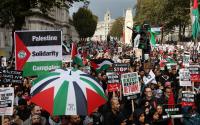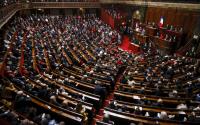Arafat's mask slips, but he still has a trick up his sleeve
26 June 2002By Phil Reeves in Jerusalem
A sea of brave faces being loyally worn by Yasser Arafat's aides yesterday failed to disguise the alarm and despondency felt by the Palestinians over President George Bush's Middle East policy speech.
The most deceptively masked face was that of Yasser Arafat himself, whom Mr Bush has – without specifically naming him – made clear must leave power if the United States is to support even a provisional Palestinian state.
Confined to his wrecked, shell-punctured Ramallah headquarters, Mr Arafat sought to shrug off the speech yesterday but few Palestinians were in much doubt of its implications. They knew the Bush presidency has lined up squarely behind Ariel Sharon and his supporters from the Israeli right-wing, ensuring that there will be no negotiations over statehood until a set of highly difficult pre-conditions are met by the Palestinian side.
Lacking any other sensible strategy, Mr Arafat's aides were pragmatically – along with Britain and the EU – doing their best to make the best of a bad job by highlighting the positive aspects of the president's address, citing it as evidence the Americans were at least willing engage in solving the conflict.
But suspicions abound among the more pessimistic observers that Mr Bush's words were, in fact, those of a politician who is seeking to do the precise opposite – not to get deeply embroiled in the conflict having concluded there is no lasting solution in prospect, and trying and failing can only damage his position at home.
Overall, the Palestinians could not conceal their dismay, a mood that ran so deep in some parts of the West Bank and Gaza Strip that radicals on the Palestinian "street" were threatening to punish as traitors any officials who spoke in favour of Mr Bush's words.
The Palestinian disappointment was almost matched by the Europeans who have been pressing for a new diplomatic initiative to stem conflict, amid genuine fears among some that Ariel Sharon's strategy has long been to systematically reoccupy the West Bank, with a view to holding on to most of it. Israeli forces and armour now routinely go in and out of the eight main Palestinian towns on the West Bank, given autonomy under the Oslo accords.
It is understood that US State Department – which opposed Mr Bush's call for Mr Arafat to be replaced, were in no rush to instruct its officials in Israel and the occupied territories to act in response to Mr Bush's speech.
Intriguingly, sources said yesterday that the US diplomats on the ground had yet to receive orders to change their approach to Mr Arafat, whom until now they have – albeit unenthusiastically – acknowledged as the legitimately elected Palestinian leader.
Critics of the Bush speech, which clearly delighted Mr Sharon and the Israeli right, argued it played into the hands of the Islamic-nationalist Hamas group that has dispatched more suicide bombers into Israel than any other militia.
Throughout the eight-year Oslo period, Hamas maintained Mr Arafat was wrong to trust the Americans, who acted as mediators, because the United States was invariably strongly pro-Israeli. Their activists yesterday were quick to cite Mr Bush's words as proof that Hamas was right all along.
There were bleak predictions the dispute is to worsen. "Ariel Sharon can now do whatever he likes," said one diplomatic source, " It is absolutely given him the green light. There will be a lot more bloodshed and a lot more suicide bombers."
Mr Arafat may yet have one more tactical play up the sleeve of his olive-green fatigues as he broods his fate in his fetid and crumbling West Bank headquarters, besieged by Israeli tanks. He is likely to respond to Mr Bush's demands for a change in the Palestinian leadership – and his plea for more democracy – by naming the date of elections.
It has already been decided that these should be within the next six months. He is certain to argue elections cannot be held unless Israel ends its massive blockade of Palestinian towns and pulls back its troops, allowing candidates to campaign and voters to go to the polls.
Bassam Abu Sharif, an adviser to Mr Arafat, said: "We welcome and are ready for elections. This necessitates immediate action from Bush to convince the Israeli army to withdraw from cities and villages to allow the voters to vote."
Special note will have been taken by the Palestinian leader's advisers that Mr Bush's speech proffered help from the United States, along with others in the international community, to "organise and monitor" fair, multi-party local elections by the end of the year with national elections to follow.
"Can you imagine the points that Arafat would score if US monitors come in and say the elections were free and fair, and the only problem was the Israeli occupation," said one diplomatic source yesterday.
Arab analysts seem convinced Yasser Arafat would win an election, not least because of the probable popular backlash against attempts by the United States to dictate the choice of leadership.
Mr Arafat seemed confident yesterday. He appears to have seized on Mr Bush's decision not to name him in person in the speech as evidence the president's remarks about a new leadership were not directed at him. "My people will decide," he told reporters, "They are the only ones who can determine this." His ratings have taken a hefty battering in the last few months, not least because of his agreement to allow six Palestinian men – five from the Popular Front for the Liberation of Palestine – to be locked up in a Jericho jail under British and US supervision.
But a recent poll by the Palestinian Jerusalem Media and Communications Centre found that 48 per cent of those who were surveyed expected Arafat to win. And that was before Mr Bush's speech.
http://news.independent.co.uk/world/middle_east/story.jsp?story=309117






